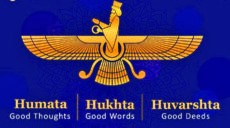Er. Zarrir Bhandara As we embark on the New Year 2025, it’s an opportune time to reflect on the profound teachings of Asho Zarthost Paigambar regarding a virtuous life. Zoroastrianism, at its core, emphasizes the harmonious interplay of Humata (good thoughts), Hukhta (good words), and Hvrashta (good deeds). This triad, beautifully encapsulated in the Persian […]
Tag: Humata
Finding Our Purpose: From Good To Righteous Action
We have been told from an early age to “do Good” and practice Good thoughts, Good words and Good deeds. But, what really is ‘Good’? And, why do we have to do this so-called ‘Good’? In our Zoroastrian religion, we are told to practice ‘Humata, Hukhta and Hvrasta’; even our Ashem Vohu prayer says, “Doing […]
The Zoroastrian Way Of Life And Living
A few days ago I got into a discussion with a friend who asked me a simple yet very profound question. The question was pertaining to the Zoroastrian way of life and living and whether it is any different from what persons of other faiths and beliefs follow. I responded briefly and assured him that […]
હુમ્ત-હુખ્ત-હુવરશ્ત
હુમ્ત, હુખ્ત, હુવરશ્ત, ત્રણ અવેસ્તાન શબ્દો પારસી ધર્મના નૈતિક સંહિતાને સમાવે છે – જે યોગ્ય હેતુઓ (વિચારો), સાચા ઉચ્ચાર (શબ્દો) અને ધાર્મિક વિધિઓ (કાર્યો) (રેફ. ઝોરાસ્ટ્રિયન્સ) સાથે કાર્યક્ષમ રીતે પૂજા કરવાની તેની પવિત્ર ફરજ નિભાવવા માટે જરૂરી છે. હુમ્ત એ અહુરા મઝદાનો પ્રથમ વિચાર કહેવાય છે, જે દુષ્ટ-મુક્ત બ્રહ્માંડનો વિચાર છે. આમ, આ ધ્યેય તરફ […]
Humata, Hukhta, Huvarshta – The Ethical Code Of Zoroastrianism –
Er. Adil J. Govadia Humata, Hukhta, Huvarshta (HHH), the three Avestan words, encapsulate the ethical code of Zoroastrianism – these are considered a moral extension of a Mobed’s (priest) threefold professional deportment, required to perform his hallowed duty of worship efficiently with right intentions (thoughts), right pronunciations (words) and precise conduct of rituals (deeds) (Ref. ‘Zoroastrians, Their Religious […]
Essence Of Being Zoroastrian
The essence of being a Zoroastrian is to live life to the fullest and celebrate life, every single day. Although not a practising Zoroastrian, Eleanor Roosevelt (U.S. First Lady, Diplomat and Human Rights Activist) came closest to this truth when she said: “The purpose of life is to live it, to taste experience to the utmost, […]
Parsi Embroidery: A Heritage Of Humanity – I
Complex roots and routes lie behind what we call ‘Parsi Embroidery’ today. The tradition grew from Achaemenian Iran, through the Silk Route into China and then came with Indian and European influences back to its originators, the Parsi Zoroastrians in India. Now a tiny minority of fewer than 55,000 individuals in India, Parsi Zoroastrians have […]






